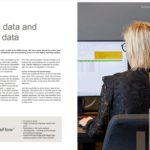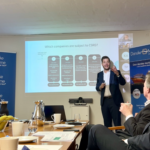Pioneering Sustainability Trends - How Leaders Can be Frontrunners
Ever feel like your local and global government takes time to make a change? You’re not alone, many people feel this way but the spark to light the fire doesn’t always have to start via government institutions. Leadership is taking action when others stand still! Here, we go into detail on how CEOs can be the drivers of this change.
Economic Clout for Environmental Change
With all fortune 500 companies each having an annual revenue greater than that of the UN it could be argued that some responsibility should fall on the shoulders of these companies. As many of these companies often profit most from environmental degradation, they should therefore also embrace accountability for their actions. One of the best ways to do this starts with the CEO. CEOs need to begin using their clout to influence lobbyists and stakeholders throughout value chains and supply chains. By doing this, promoting global environmental change becomes viable. Leveraging things like economic influence can encourage action on things that consumers have already been signaling they care about. Stakeholder interests push companies, who then need to push governments. Now is the time for CEOs and companies to be explicit in what they stand for and take action.
Investing in Sustainable Collaboration
CEOs need to begin investing more in collaborative actions that support their company’s, and stakeholders’, ethical code on sustainability. This could include anything that contributes to research for new solutions to environmental problems, be it time, money, or investments. In this way CEOs can head the battle on issues which consumers have begun voicing as some of their most pressing concerns. An example of this could be the relationship between ReFlow and players within the maritime industry. Here at ReFlow we provide life cycle assessment (LCA) technology and consultancy to a number of entities within maritime allowing them to accurately assess their entire scope of emissions– More than is currently required by European regulations. Innovative CEOs pushing for more sustainable methods are the drivers of this relationship and this positive change of trajectory for the environment. According to a recent global poll conducted, the majority of global respondents believe that when governments fail to take action, CEOs and leaders should fill the void to fix the societal problems the world is facing (Edelman, 2021).

68% of respondents believe CEOs should step in when the government fails to fix societal problems. 66% believed CEOs should lead on change instead of waiting for the government to push for change. 65% felt that CEOs should hold themselves accountable to the public rather than just their board of directors or stockholders.
Source Image: sustainability.com, Source data: Edelman, 2021
Getting a Jump Start on the Influx of EU Regulations
With Europe being one of the global drivers when it comes to environmental legislation, the continent’s decisions on new regulations and tightened restrictions, influences global trade in a profound way. Tightened restrictions could mean supply chains stop at a different mid-link without the possibility to meet the intended end user. This missing link would be due to the product or company’s inability to compete in
European markets due to the restrictions imposed on them. An excellent example of this could be seen within the maritime industry. Not only are there products and services that occur within this industry on a smaller more localized scale, but also due to the nature of the industry, on a multi-international scale as well. For instance, different ISO standards dictate a wide variety of environmental restrictions already imposed on the maritime industry with scope 1 emissions being one of the best known. These scope 1 emissions are a result of fuel combustion engines which emit CO2 directly into the atmosphere and which are heavily regulated.
However, many players within the maritime industry have not yet begun reporting on other emissions, possibly due to the general lack of complete emissions representation within ISO 14044 and 14001. CEOs who push to act on these environmental issues and modify their current practices in preparation for impending EU regulations will get a jump start on a lot more than just upcoming regulation. These CEOs also enjoy being able to satisfy their customers and stakeholders interests and needs while becoming pioneers within their industry.
3 Take-Aways
- Companies and CEOs alike need to begin leveraging their economic clout and push governments to act on environmental issues that their customers and stakeholders have already expressed concern for
- CEOs need to invest more heavily in collaborative sustainability efforts to back their core values
- Companies need to modify their current practices to prepare for impending EU regulations
References
- Edelman. 2021. Edelman Trust Barometer. Online posting. Edelman. Accessed 15 June 2022. https://www.edelman.com/sites/g/files/aatuss191/files/2021-03/2021%20Edelman%20Trust%20Barometer.pdf
- https://www.sustainability.com/globalassets/sustainability.com/thinking/pdfs/2022/esi-sustainability-trends-report-2022-2.pdf








